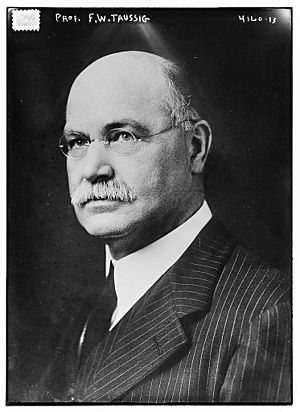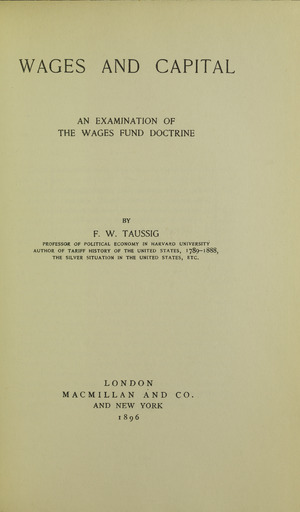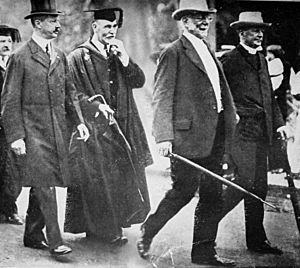F. W. Taussig facts for kids
Quick facts for kids
F. W. Taussig
|
|
|---|---|

Taussig, c. 1915
|
|
| Born |
Frank William Taussig
December 28, 1859 |
| Died | November 11, 1940 (aged 80) Cambridge, Massachusetts, US
|
| Alma mater | Harvard University |
| Spouse(s) |
|
| Scientific career | |
| Institutions | Harvard University |
| Doctoral students |
|
| Influences | Charles F. Dunbar |
Frank William Taussig (1859–1940) was an American economist who is credited with creating the foundations of modern trade theory.
Early life
He was born on December 28, 1859, in St. Louis, Missouri, the son of William Taussig and Adele Wuerpel. His parents encouraged his literary and musical interests, and he played the violin at an early age. He was educated in the St. Louis public schools and at Smith Academy in that same city. He then went to Washington University there but, after a year transferred to Harvard from where he graduated in 1879.
He traveled in Europe for a year, taking some time to study economics at the University of Berlin. He then did graduate work at Harvard in law and economics while he was secretary to President Charles W. Eliot for some years.
Teaching
He got a law degree in 1886 and was appointed assistant professor at Harvard. He became professor of economics in 1892, and he remained at Harvard for the balance of his professional career except for several years spent in federal service and some time spent traveling in Europe recovering from a nervous disorder.
Beet sugar and tariff
In a 1912 article in The Quarterly Journal of Economics, Taussig favored protecting the beet sugar industry with a tariff on sugar imports. A beet sugar industry gives intangible benefits by adding to the versatility and capabilities of American agriculture. Unskilled labor gains employment in the labor-intensive beet sugar sector of agriculture. Beet sugar grows best in cool climates of the irrigated regions of Colorado, Utah, Idaho, Montana, and California.
Other positions held
He was the editor of the Quarterly Journal of Economics from 1889 to 1890 and from 1896 to 1935, president of the American Economic Association in 1904 and 1905, and chair of the United States Tariff Commission from 1917 to 1919.
In March 1919, he was called to Paris to advise in the adjustment of commercial treaties, and in November, on invitation of Woodrow Wilson, he attended the second industrial conference in Washington, DC, for promoting peace between capital and labour. He was a strong supporter of the League of Nations.
Death
He died on November 11, 1940, aged 80, in Cambridge, Massachusetts. Taussig is buried in Mount Auburn Cemetery in Cambridge.
Legacy
The successor to his chair at Harvard was Joseph Schumpeter. In 1888, he married Edith Thomas Guild. One of their four children was Helen B. Taussig (1898–1986), a noted pediatrician and cardiologist. F. W. Taussig's first wife died in 1910, and he married Laura Fisher.
Works
Much of Taussigs work is available from Internet Archive:
- 1883: Protection to Young Industries as Applied to the United States (second edition, 1886)
- 1885: History of the Present Tariff, 1860–83
- 1888: The Tariff History of the United States eighth edition, 1931,
- 1892: The Silver Situation in the United States (second edition, revised, 1896)
- 1896: Wages and Capital
- 1911, 1915, 1927 Principles of Economics, volume 1, Volume 2
- 1918: Some Aspects of the Tariff Question
- 1915: Inventors and Money Makers, Brown University lectures
- 1920: Free Trade, the Tariff, and Reciprocity
- 1927: International Trade
- 1887–1935: Economic theory exam questions



